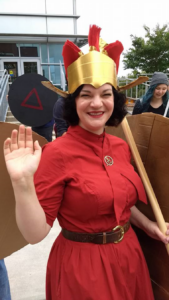Molly Jones-Lewis, Senior Lecturer

“Ever since I was a little girl, the Ancient Mediterranean fascinated me in a way that my peers found confusing. I was in love with my first special interest, a part of the neurodivergent experience I particularly treasure as an asset in the classroom. What began as a confusing and socially isolating part of my childhood is now my profession, and it sits at the heart of my passion for bringing all sorts of people into a shared space of joyful learning.
I was doing inclusion work before I knew what it was, simply by trying hard to understand the differing social rules and codes of spaces I inhabited and coming up with ways to enter them without losing my sense of self, then bring others with me. Finding ways to share my joy about the ancient Mediterranean with people who didn’t also immediately love it was the foundation of my teaching skills. Understanding history gave me another dimension to study social dynamics, and this became my research interest: the working conditions of ancient Roman physicians, how they communicated with patients and the legal system, and how the system responded to those strategies. In ancient Rome, most physicians were immigrants with a history of enslavement or being colonized. They included people of all genders and social classes. I saw in them an early version of the life my parents, both medical doctors, had lived; diverse working environments, stressful interactions with high risk for both parties, and ethical histories that gave subtext to even the simplest conversation. My story isn’t everyone’s, but I do think that we who choose to be educators have a natural drive to make the inaccessible comprehensible. DEIA work is the pursuit of effective ways to invite all sorts of people into our favorite subject matter, and I think attending to it makes our day-to-day experience more fulfilling and sustainable.
My publications all grapple with the intersection of ancient DEIA issues, and it informs my teaching too. When I began crafting my course policies to make things work for students with disabilities and illnesses, it was because I had struggled mightily with classrooms that had punished me when my body was failing to work like a healthy 20-year-old’s, and I couldn’t intuit other people’s expectations and rules. I also knew how much I’d been able to accomplish in supportive environments that played to my strengths, and I wanted to give that level of care to my students. I wouldn’t have called it DEIA work at the time; at former institutions, I often had to push back at administrators concerned that extended deadlines and remote attendance options would indicate a “lack of rigor.” Being at UMBC has been a welcome breath of fresh air, and it’s here that I’ve found like-minded colleagues who have broadened my horizons and increased my toolkit immensely.
The pandemic years stretched and stressed my resources, and I’m now collaborating with Information Technology to create a scalable and sustainable hyflex classroom model for teaching Latin language and upper level seminars. In language teaching particularly, contact hours are critical components of quality instruction and attendance issues present a major barrier to students experiencing illness and/ or caregiving responsibilities. Being able to attend Latin or Greek class from home has been a lifeline to students who would otherwise have fallen hopelessly behind after a two week illness, but the tools I have are not quite right, especially for Greek where the alphabet is different than English. Even in Latin, standard keyboards don’t allow for macron marks, a vital part of accurate Latin reading. Collaborating with UMBC’s tech experts to give my students more ways to navigate around barriers to attendance and participation in the classes where it’s most critical, and having expert support keeps my workload from becoming unsustainable.
At its heart, DEIA work is prioritizing empathy as a component of professionalism. It isn’t about being correct, an amateur therapist, or lenient. Rather, it is about thinking practically about what it is you want your students to learn, then making a room in which there are many paths to that goal, including paths you didn’t think of. It need not come at the expense of your own resources, and the rewards are students who struggle less and enjoy your material more. It also opens your eyes to new paths through your research; an engaged student who is unlike you will ask you the very best questions.”